Fans of 2009’s PS3-exclusive RPG Demon’s Souls are sure to have questions about Dark Souls, which is being produced under the watchful eye of Demon’s Souls director Hidetaka Miyazaki. Though the game was formally revealed just days ago, I had a rare opportunity to speak directly with Miyazaki about his plans for Dark Souls. We discussed the game’s soul-crushing difficulty (it’s going to get harder, not easier), his favorite new feature (a new form of “emotional communication” via Beacon Fires), and the games he’s most excited to play in 2011 (hint: UNCHARTED 3).
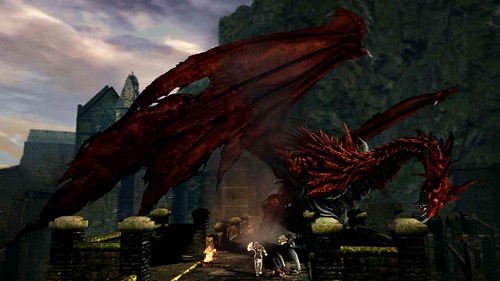
Sid Shuman: Would you describe Dark Souls as a sequel to Demon’s Souls, or a spiritual successor? Does Dark Souls reside in the same universe as Demon’s Souls?
Hidetaka Miyazaki, director, Dark Souls: Dark Souls is not a sequel to Demon’s Souls by any means. However, it’s created by the same producers and director and so the ideologies, concepts, and themes have carried over and are similar. It’s a totally new game with similar concepts.
SS: Demon’s Souls is infamous for its difficulty. Will Dark Souls be as difficult?
HM: Yes, Demon’s Souls was known for its incredible difficulty [laughter]. With Dark Souls, there is no intention to decrease the difficulty at all. Actually, we intend to increase the difficulty of the game. (Sid: !!!) But not simply by making the game more difficult, but by giving players the freedom to strategize freely and conquer that difficulty, and to be rewarded accordingly.
This is an analogy we often use: We are trying to create a game that is spicy. And we want to make it as spicy as possible. But it’s edible and tastes good and leaves you wanting more.
SS: How do you keep a difficult game from becoming punishing, and drive the player to quit in frustration?
HM: Good question. We can’t tell you all of our secrets, but there are a few ways we prevent users from drifting away. Number one, the difficulty is not dependent on the skill level of the user. We have not created a game where players who react faster or press buttons faster are better than others. Second, when a player dies, we try to leave a sense of “maybe if I try a different strategy I can succeed.” Things that you lose in death can be outweighed by what you gain by trying again. We try to give players lots of freedom to design their own gameplay style, and we’ve implemented enough content to enable users to continue challenging themselves and continue making progress.
One more aspect is the difficulty based on repetitiveness. We don’t want users to have to constantly carve away health from enemies. We’ve created all characters — including enemies and the player — to have high attack power but low defense. We don’t want users to hack and hack and hack away to defeat an enemy. It’s more strategic. We want users to think, “if I avoid this enemy, maybe I can overcome him.” We don’t want players to be frustrated by doing the same things over and over.
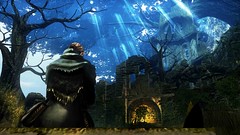
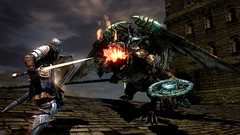
SS: Death was a part of life in Demon’s Souls. But it required that you replay the entire level from scratch with enemies in identical locations. Will Dark Souls force players to restart levels? Will levels be less repetitious to replay?
HM: The main concept has not changed: You try something, die, learn from your mistakes, and eventually overcome those mistakes. In Dark Souls, we’ve added the ability to players to choose their recovery point — essentially respawn points. If you die, you won’t be taken back to the beginning of the level. And as you explore the world, you can carve out your own territory and retry quests you failed. That’s a big difference. It’s an aspect that we want players to use to strategize their approach to the game.
SS: Will Dark Souls have a less intimidating control scheme than Demon’s Souls?
HM: In Demon’s Souls, when you finally get used to the controls, it feels pretty good. So for Dark Souls, the controls and feel won’t change too much. However, we are adding a tutorial so players don’t have to fight to learn how to play. We don’t want to take the players step-by-step, we just want them to get past the first step.
But generally, for Dark Souls, learning commands and controlling your character is probably a little bit easier. But to counter that, we’ve added a lot of aspects that users must learn beyond the controls. The amount of magic, the number of weapons, the types of weapons, the moves attached to the weapons…there is a lot more that players must learn in order to conquer the challenges.
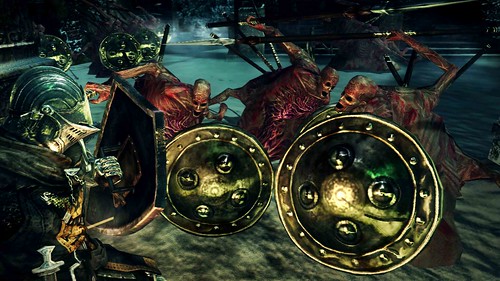
SS: Does that mean we can expect a lot of new weapons with unique functions?
HM: The simple answer is yes. But we’re not just increasing the number of weapons; we want to improve the uniqueness of each weapon. Each weapon will have characteristics that are vastly different from other weapons in the game. As an example, the player starts with a Long Sword. Eventually he might find a Holy Sword, which is far more powerful but is used very differently. Some players will choose to continue using the Long Sword simply because they’re more comfortable with it.
We want to give players many options, even if that means they use the sword that ‘fits best in the hand.’ We want you to become emotionally and physically attached to the weapon you’re using. Perhaps the Long Sword, after you’ve used it for so long and taken such good care of it, is the real Holy Sword. [laughter] The real Holy Sword, though, might be very hard to master despite its power. And some players will say, “This is difficult to use? Leave it to me, I’ll master it!” [laughter]. The mind games and strategizing — that’s the most fun aspect of the game to me.
SS: How will dual-wielding two weapons impact combat? Is dual-wielding a successful strategy, or more of an “expert’s mode”?
HM: Dual wielding is an option, but it’s a very difficult choice for novice players. The default fighting style is holding a shield in one hand, a weapon in the other. And the shield adds a lot of protection, it’s quite effective. If you see another player dual wielding, we want you to think, “Oh my god, this guy is special!” Dual wielding is a way to challenge yourself, but it has a lot of downsides and makes the game much harder. When you’re in trouble, you’ll want to return to your shield and sword.
We want to keep dual wielding special. It’s a very unique strategy that will hopefully give a new experience to the player as well as those watching him.
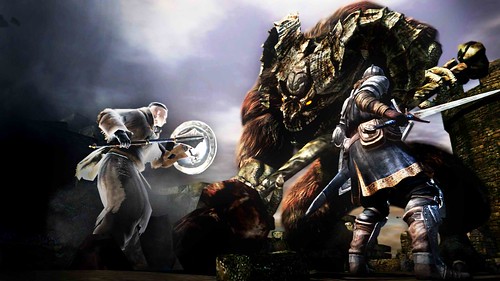
SS: Like Demon’s Souls, Dark Souls will include online co-op and competitive play. Are you planning any broad changes to the multiplayer?
HM: Yes. Throughout the game, there will be both cooperative and competitive play with other players. Each user will enjoy a unique single-player game; at times, they will cross paths with one another. Depending on the situation, the time, and the players’ goals, those players may cooperate or compete against each other. The multiplayer system we’re creating will envelop the single-player mode. Multiplayer will enhance single-player, make it more unique, compared to other games that emphasize traditional multiplayer co-op or competitive play.
SS: What’s the single addition to Dark Souls that you’re most excited by?
HM: Probably the Beacon Fire. It stands for a lot of things. It serves as a recovery point; when the player’s health is low, the Beacon Fire helps you recover. It serves as a respawn point as well. So it’s powerful from a gameplay perspective. Secondly, the Beacon Fire will be used to share experiences with other players. It’s a place where players can gather together and communicate — not verbally communicate, but emotionally communicate. Third, it’s probably the one place in Dark Souls where users can relax just for an instant. In this cold, dark world, the Beacon Fire is a place of warmth. It’s one of the few locations in the game that is heartwarming. It expresses this dark fantasy world I’m trying to create.
SS: How will character creation work? Are there still classes? How can I augment and customize my character?
HM: The basics are quite similar to Demon’s Souls, but you can customize the physical build of your character now in addition to his face. There’s a lot of customization in terms of gameplay styles and parameters. It’s very open, and there are many more options than in Demon’s Souls. You can create any type of character you’d like to create.
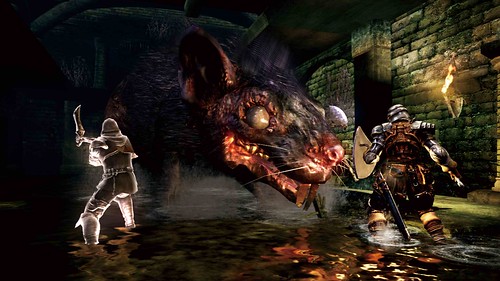
SS: What’s your philosophy regarding monsters in Dark Souls? Are you going for really grim, grotesque creatures?
HM: Calling it a “philosophy” is probably overstating it a bit [laughter]. I want to expand the range and variety of all the enemies, whether they’re hideous or beautiful or strong. I don’t lean towards any particular type, but [high-level enemies] will be pretty disgusting. And you might not believe this, but all the monsters I design — from Demon’s Souls to Dark Souls — are “beautiful” to me, no matter how gruesome their appearance.
SS: What games are you looking forward to playing in 2011?
HM: Politically this is sort of a difficult question to answer! [laughter] I’m a big gamer. But to be honest, right now I absolutely love Magic: The Gathering Online. For 2011, I’m really looking forward to UNCHARTED 3 and The Elder Scrolls V: Skyrim.
UNCHARTED 2 came out around the same time as Demon’s Souls, so it was a big competitor for us at the time. But UNCHARTED has done so well, and now I’m really excited for UNCHARTED 3. I’m quite interested in Skyrim because the fantasy world is something I really look forward to in games.
